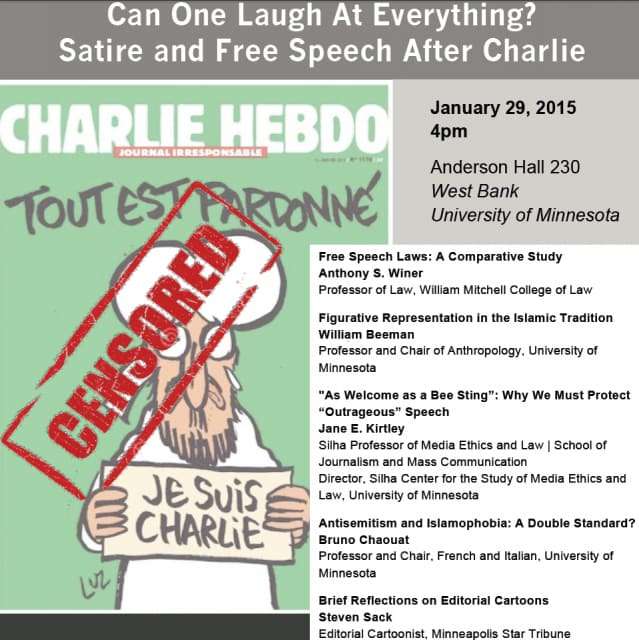The Volokh Conspiracy
Mostly law professors | Sometimes contrarian | Often libertarian | Always independent
More on the University of Minnesota Charlie Hebdo controversy: 'There are limits on free speech'

As I noted Tuesday, in late January some University of Minnesota professors put together a panel on the Charlie Hebdo murders; the panel was promoted with the flyer quoted above, which includes the cover of the first post-murder issue, with a "CENSORED" stamp added on top of it. After the event - which was apparently quite successful - the university got petitions signed by hundreds of people complaining that the flyer was offensive to them. And the university's Office of Equal Opportunity and Affirmative Action [EOAA] ordered staff to take down copies of the flyers, both from bulletin boards and from any university Web sites.
Fortunately, the dean of the College of Liberal Arts, John Coleman, promptly reversed that order, and has also refused to go along with the EOAA's request that he publicly condemn the use of the Muhammad image. But Tuesday's Minneapolis Star-Tribune offers more perspective on the office's reasoning:
Kimberly Hewitt, the director [of the EOAA], said her office had no choice but to investigate. "There are limits on free speech, and that would be where you have harassment of an individual based on their identity," she said. "We got complaints from eight individuals and a petition from 300 people saying that they felt that this was insulting, disparaging to their faith."
When word of the complaints got out, a college administrator sent out an e-mail asking that the fliers be taken down. Coleman, the dean, said he promptly reversed that order when he learned about it….
In the end, the investigation concluded that the flier "does not rise to the level of discriminatory harassment that would violate University policy," according to a March 27 report.
But it also found that, because many people found the poster "personally offensive and hurtful," it had contributed to an "atmosphere of disrespect towards Muslims at the University." In a letter to Coleman, Hewitt recommended that he "communicate that [the College of Liberal Arts] does not support the flier's image of the Charlie Hebdo depiction of Muhammad."
Of course, whatever limits on "harassment of an individual based on their identity" might be (a complicated question, partly because "harassment" is so ill-defined), here there was no harassment of an individual. The flyer didn't call people's homes to leave offensive messages. The flyer didn't follow anyone, calling them names. The flyer didn't even mention any faculty, staff member or student whom it was criticizing by name (though most such criticism would indeed be protected free speech).
Rather, the flyer contained an image that some individuals find offensive because of their religion. If that is enough to trigger an investigation - on the theory that any speech offensive to individuals of certain religious groups may be "harassment of an individual based on their identity" - then something is very badly wrong in the EOAA.
Indeed, even speech that intentionally "disparag[es]" "faith[s]" is exactly the sort of thing that universities should host, alongside speech that defends people's faiths, or that disparages or defends political, moral or scientific beliefs. (The Establishment Clause has been read as prohibiting governments, including public universities, from taking official stances on theology or on the merits of various religions, but it most certainly does not prohibit panels on religious topics, or panels that discuss controversies or current events that involve religious belief, including in ways that disparage or praise certain beliefs.) Islam, Christianity, Judaism, Buddhism, atheism, feminism, socialism, capitalism, nihilism, existentialism - all of these (and much more) are proper subjects for academic discussion and critique, no matter who might find it "personally offensive and hurtful."
It is true that even quoted blasphemy, as in the event flyer, is "disrespect[ful]," in the following way: It communicates to members of a certain religion, "We do not feel ourselves bound to respect your demands about what we should or should not say." And "respect" here means both "abide by" and "express respect for."
But this particular kind of disrespect is the very essence of academic freedom - the judgment that no religious group can set the terms for what can or cannot be said or shown. Fortunately, it looks like the academics at the University of Minnesota, including the dean, understand that principle. Unfortunately, it looks like they have not (or at least had not) made sure that the EOAA abides by it.


Show Comments (0)